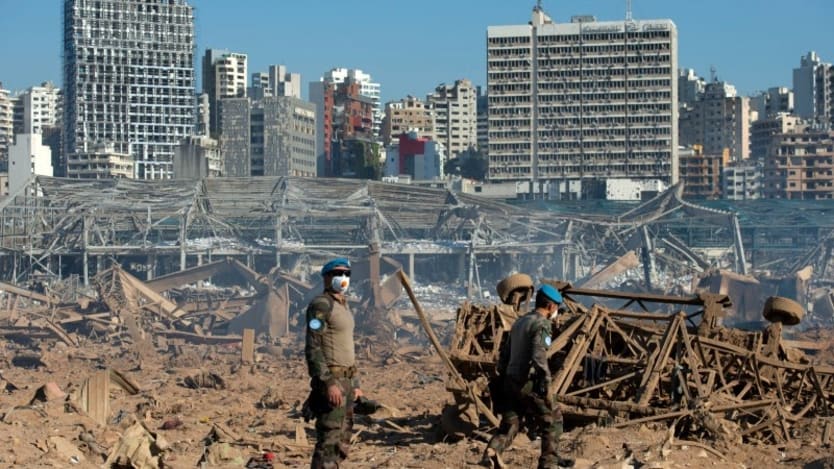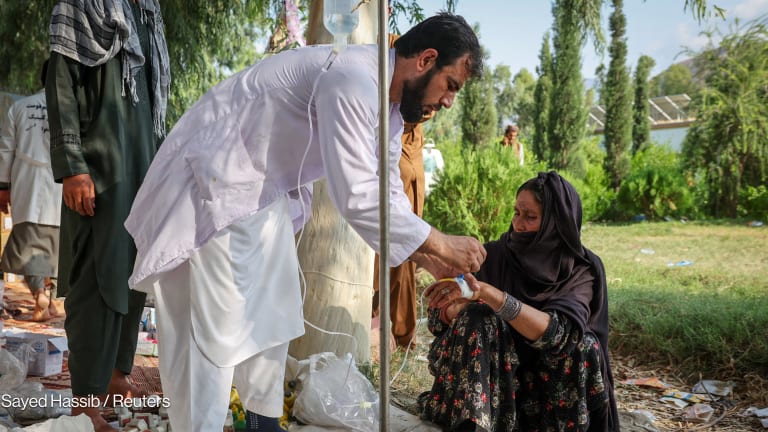
NEW YORK — The humanitarian response to the deadly explosion in Beirut last week is complicated by preexisting economic instability and rising levels of food insecurity in Lebanon. But the COVID-19 pandemic is also pushing some humanitarian responders to rethink their strategy, with new challenges of border restrictions and health concerns.
Beirut confronts a disaster on top of a pandemic on top of a crisis.
“I have done humanitarian responses in Nigeria, Yemen, Somalia, and Ethiopia, but now we are doing it in times of COVID, which means that one has to be around 24/7 on three different devices,” said Rafael Velasquez, director of Mercy Corps’ Lebanon country office, in reference to the three cellphones he carries to ensure he can find a connection.
Typically, Mercy Corps would set up a central war room for staff members to strategize on their emergency work and develop operational plans, which include supporting small businesses that have been destroyed in Beirut.
Now, Velasquez is one of three people working out of Mercy Corps’ multifloor Beirut office, with staffers scattered across Beirut and as far away as India as a result of travel restrictions and social distancing. Internet stability — once a given in the office — is now a challenge for many people working remotely.
“I walked out, and I lost connection four blocks away from the office. Right now it is OK, but we have lost connection at least four times today. It is not business as usual when it comes to humanitarian response,” Velasquez told Devex.
The explosion Tuesday, thought to have been caused by the detonation of approximately 2,750 metric tons of ammonium nitrate being stored near port facilities in Beirut, led to at least 150 fatalities, wounded thousands of people, and displaced 300,000. Those numbers could rise as search and rescue efforts are completed and damage is assessed, the World Health Organization said last week.
WHO has appealed for $15 million for the crisis, and the United Nations has warned that needs will increase. The U.N. Office for the Coordination of Humanitarian Affairs has so far released $15 million for humanitarian aid.
“We recognized our disaster response has to take a different approach. Deploying large teams on a moment's notice is not really practical anymore.”
— Chris Skopec, executive vice president for global health, Project HOPEThe disaster comes as Lebanon is experiencing a spike in coronavirus cases and is under government lockdown. The country’s unemployment and inflation rates have also worsened during the pandemic.
“We're continuing to assess what the Lebanese people's needs are, whether they are about their health, whether they're about their economic needs, now that things like food stocks have been destroyed, whether it's about medical needs given the destruction of medical facilities at a time when COVID‑19 is raging and, of course, environmental needs because there will need to be an assessment about the conditions in which the people are living,” U.N. spokesperson Farhan Haq said during a media briefing Friday.
Several international NGOs, local nonprofits, and U.N. agencies have sustained damage to their offices, in addition to staffers who have lost their homes or suffered injuries. The World Food Programme, working to distribute 5,000 food parcels to families, is among them.
“All this is happening so quickly, and it is unfolding as we are talking. WFP’s office is damaged, and staffers are working remotely from their homes. Some of our employees have lost their homes. We did not lose any staff members but did have a number of staff who were injured and recovering,” according to WFP spokesperson Steve Taravella.
Before the explosion, 50% of Lebanese respondents to a recent WFP survey said that they did not have enough to eat, Taravella said.
“On top of this, a country that imports almost 85% of its food has now seen its major port destroyed, and food imports had already shrunk. We recorded a 13% drop in food imports from October to April,” Taravella said.
The food parcels being distributed to affected households, which contain staples like rice and lentils, are designed to last each family for about a month.
“This is not a long-term solution. This is a Band-Aid for people whose suffering is unexpected,” Taravella said.
The international relief organization Project HOPE, meanwhile, is working to quickly deliver medical supplies, including personal protective equipment — “something we have been moving around the world nonstop since January with COVID responses, with a heavy focus on getting these into the country as quickly as possible,” said Chris Skopec, Project HOPE executive vice president for global health.
“You cannot maintain social distance when it comes to an emergency. ... We are all wearing masks, but we are not thinking about COVID.”
— Rita Rhayem, director, Caritas LebanonShortfalls of medical supplies and PPE are widespread across Beirut health clinics and central hospitals, several of which were destroyed or damaged by the explosion.
“It shows up in everyone's reports — from WHO, UNICEF, OCHA. There is such a dearth of supplies, and the needs are so tremendous,” Skopec said.
Project HOPE is working with local partners to ensure that their logistics and supply chain support are capable of delivering the necessary large shipments of PPE and other medical supplies, especially since they have not received a guarantee from the government that it will not delay or stop imports.
“We recognized our disaster response has to take a different approach. Deploying large teams on a moment's notice is not really practical anymore, and this is really a perfect example of that. It is extremely difficult to put people and expert responders on a plane and get there,” Skopec said.
“We have a prime network of health and humanitarian NGOs and individuals in the country, and we are looking at how we can mobilize our national resources,” he continued.
The explosion’s immediate aftermath is the main priority for Caritas, which has set up mobile health clinics in Beirut. Some wounded people are not seeking treatment because of COVID-19, according to Rita Rhayem, Caritas Lebanon director. But prioritizing COVID-19 at the moment is not possible, she said.
“COVID is not a priority for us. We are not thinking about it. There is an explosion and we are there. You cannot maintain social distance when it comes to an emergency. You totally forget about social distancing when there is someone you need to assist. We are all wearing masks, but we are not thinking about COVID,” Rhayem said.
“We know that it is there, and unfortunately we cannot predict what will happen, but the explosion is our priority. It coincides with an economic free fall for our country, so it is layers of conflict that are complicating our response,” Rhayem added.








